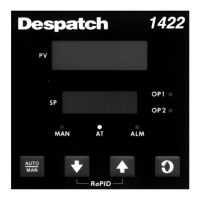8
AC Power Wiring
Neutral (For 115 VAC)
It is good practice to assure that the AC neutral is at or near ground potential. To verify
this, a voltmeter check between neutral and ground should be done. On the AC range,
the reading should not be more than 50 millivolts. If it is greater than this amount, the
secondary of this AC transformer supplying the instrument should be checked by an
electrician. A proper neutral will help ensure maximum performance from the
instrument.
Wire Isolation
Four voltage levels of input and output wiring may be used with the unit:
• Analog input or output (i.e. thermocouple, RTD, VDC, MVDC, or mADC)
• SPDT Relays
• SSR driver outputs
• AC power
The only wires that should run together are those of the same category. If they need to
be run parallel with any of the other lines, maintain a minimum 6 inch space between
the wires. If wires must cross each other, do so at 90 degrees. This will minimize the
contact with each other and reduces "cross talk". "Cross Talk" is due to the EMF
(Electro Magnetic Flux) emitted by a wire as current passes through it. This EMF can
be picked up by other wires running in the same bundle or conduit.
In applications where a High Voltage Transformer is used (i.e. ignition systems) the
secondary of the transformer should be isolated from all other cables.
This instrument has been designed to operate in noisy environments, however, in some
cases even with proper wiring it may be necessary to suppress the noise at its source.
Use Of Shielded Cable
Shielded cable helps eliminate electrical noise being induced on the wires. All analog
signals should be run with shielded cable. Connection lead length should be kept as
short as possible, keeping the wires protected by the shielding. The shield should be
grounded at one end only The preferred grounding location is the sensor, transmitter or
transducer.

